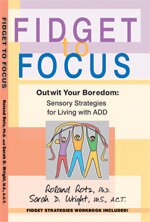Book: Excerpts
Living with Attention Deficit Disorder (ADD) means always looking for a new or different way to manage the ongoing struggles of life. Often it seems that just as we start to get ahead, something is there to trip us up. ADD can make us feel that no matter how hard we try, our lives are and will always be two steps forward and three steps back.
When this derailment happens, there is always someone with the best of intentions, be it a friend, family member, colleague, support group member, coach, or therapist, who will suggest yet another strategy for us to try. And maybe we do try it, hoping that this one will work. After all, it works for everyone else. If we live with ADD, we’ve probably noticed that just about anything will work. But only briefly. Then it all falls apart again. When we experience this kind of failure again and again and again, it is painful, discouraging, and demoralizing.
Every once in a great while, a new idea surfaces that challenges our assumptions about why we do what we do. Such ideas have surfaced on several occasions in the world of ADD. For instance, it would seem obvious that hyperactivity is the result of too much activity in the brain, yet we have learned that hyperactivity is really about inactivity in the brain. We also used to think that ADD was a childhood disorder, yet we have learned that many do not outgrow ADD, that it can persist into the teenage years and even into adulthood.
We hope that the ideas in this book will challenge yet more assumptions about why we do what we do. We hope it will give everyone, not just those with ADD, coping strategies that will work, not just briefly, but for a lifetime.
Today, we know that ADD first appears in childhood, frequently continues into adolescence, and often persists into adulthood. Current research suggests approximately 3 to 5 percent of school age children have ADD. Some studies suggest even more. We know that ADD exists worldwide and that it has a strong genetic component.
We know that other conditions are often present with ADD, conditions such as depression, anxiety, and learning disabilities. We know that the complications of untreated ADD, particularly when combined with these other conditions, can result in repeated failures in life. Unchecked, this can lead to poor self-esteem, inadequate social skills, behavioral disorders, drug abuse, and addictions, which eventually impact our ability to stay in school, keep a job, or maintain the relationships that are important to us.
Most of us have never even heard of occupational therapy (OT). If we have, it has probably been in the context of a disabled child, recuperating accident victim, or stroke patient. This is unfortunate, because the field has a lot to teach us about our normal selves, how and why we do what we do, and how to do it better.
The field of occupational therapy has long been aware of the link between sensory input, behavior, and neural functioning, thanks largely to the work of A. Jean Ayres. Dr. Ayres developed sensory integration theory to give us a better model of the relationship between behavior and brain function. She was particularly interested in the relationship among neural functioning, sensory-motor behavior, and early academic learning. We now know the interplay of sensory-motor behavior and neural functioning extends beyond childhood and affects us all our lives.
Training ourselves to fidget effectively involves developing two of the most important skills we can ever learn: self-monitoring and self-regulation. The concept of being in an optimal alertness for a given situation is new to most of us, but as we begin to pay attention, we can experience the value of it. We need to be calm and alert for most desk tasks, able to sit still and focus on the work at hand. We need to be active and alert when we play sports, reacting quickly to outmaneuver our opponents. We need to be peaceful and drowsy to fall asleep. If our internal state and the requirements of our external activity are out of sync, it can be very difficult to function and behave in an appropriate and successful manner.

